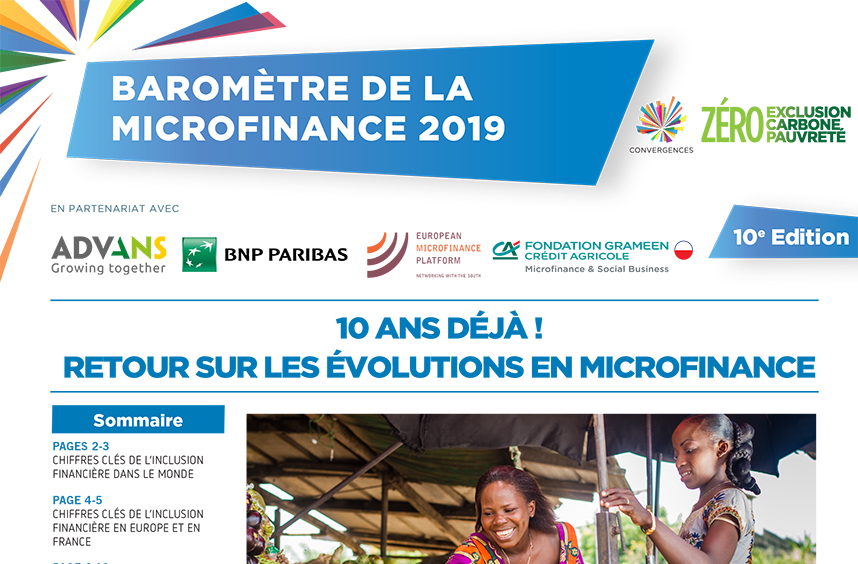Foundation Letter No. 34 is now available
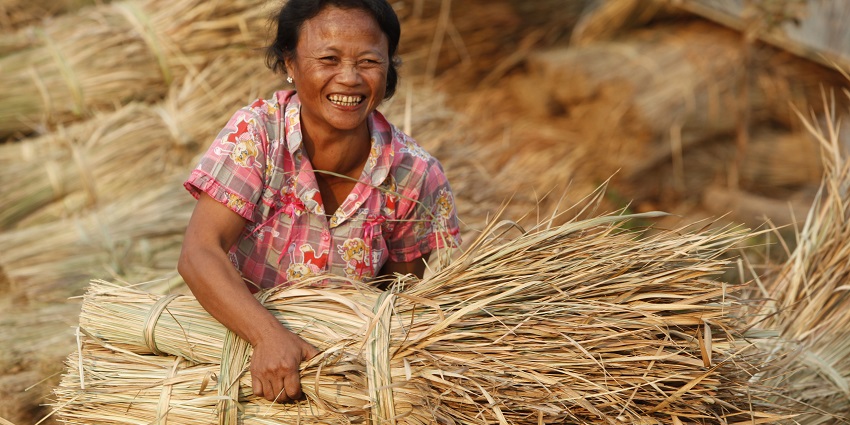
© Philippe Lissac
The Grameen Crédit Agricole Foundation is publishing its Quarterly Letter #34, which features a new section dedicated to the Foundation's partners: supported organizations, founders, technical and financial partners share their experiences on their actions, projects, connections with the Foundation, and the impact of their work in the field. Also featured in this edition is Sara Belbachir, a Solidarity Banker on a mission to the Moroccan microfinance institution Al Karama.
Furthermore, the Foundation's Letter presents its latest news and in particular its partnership signed with the UNHCR and the Swedish International Development Cooperation Agency (Sida) for the implementation of a four-year program aimed at promoting access to financial and non-financial services for refugees and host communities in Uganda.
____________________________________________________
Created in 2008, under the joint leadership of Crédit Agricole SA's management and Professor Yunus, 2006 Nobel Peace Prize winner and founder of Grameen Bank, the Grameen Crédit Agricole Foundation is a multi-sector operator that contributes to the fight against poverty through financial inclusion and social impact entrepreneurship. As an investor, lender, technical assistance coordinator, and fund advisor, the Foundation supports microfinance institutions and social enterprises in nearly 40 countries.
Another success for the Centimes Solidaires operation
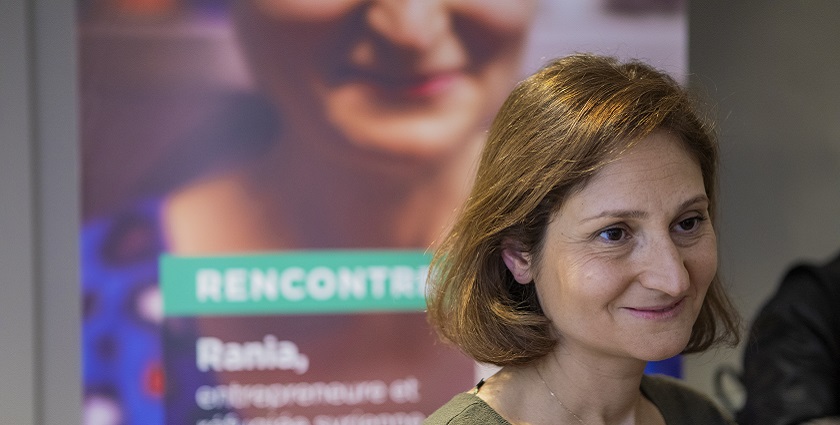
©SebastienProust
Launched in 2018 by the Grameen Crédit Agricole SA Foundation, Crédit Agricole SA, and CA Centre-est, Centimes solidaires aims to finance entrepreneurship projects by mobilizing Crédit Agricole employees, who are invited to donate 50 cents when paying for their meal in collective restaurants. For the 2019 edition, thanks to the support of employees, €8,657 will be donated to Entrepreneurs du Monde to finance the ICI (Incubation, Creation, Inclusion) program, which supports entrepreneurship projects for refugees, single parents, and homeless people in Lyon.
The campaign took place in parallel at the Crédit Agricole campuses in Montrouge, Saint-Quentin, and Lyon from November 18 to 22. Crédit Agricole SA, the Grameen Crédit Agricole Foundation, and Crédit Agricole Centre-est will join forces with their employees to contribute to the fundraising.
Last year, Entrepreneurs du Monde also received €7,000 through the initiative, which helped strengthen the ICI program. In total, 20 group training sessions were organized, and 18 people were supported to structure their entrepreneurial projects. Entrepreneurs du Monde's goal is to support 40 project leaders by 2020.
A look back at the launch event in pictures
To launch the 2019 edition of the initiative, Crédit Agricole welcomed Rania, an entrepreneur and Syrian refugee supported through the initiative, to the Montrouge Campus on November 4. After leaving Syria and thanks to the Entrepreneurs du Monde ICI Project, funded through Centimes Solidaires, Rania was able to create her own catering service to showcase her country's traditional cuisine.
Discover the video of the operation which presents Rania's journey and the testimonies of the collaborators who participated in the operation.
Solidarity Notebooks: A Solidarity Banker in Morocco
By Sarah Belbachir, Crédit Agricole SA
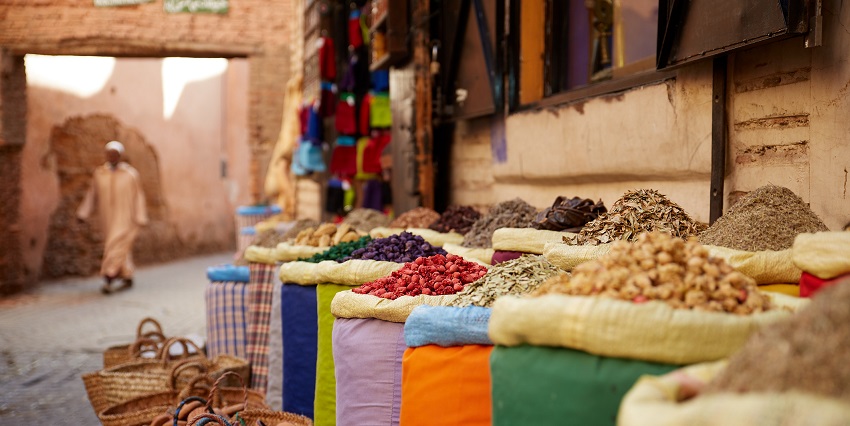
© DG
Solidarity Banker is a skills-based volunteer program open to all Crédit Agricole Group employees. Read the opinion piece by Sarah Belbachir, Solidarity Banker at Crédit Agricole SA, who went on a mission to Morocco.
Launched by the Grameen Crédit Agricole Foundation and Crédit Agricole SA in June 2018, Solidarity Banker is a skills-based volunteer program open to all Crédit Agricole Group employees, supporting microfinance institutions and impactful businesses supported by the Foundation. Discover the opinion piece by Sarah Belbachir, Solidarity Banker at Crédit Agricole SA.
_____________________
Solidarity banker… but why?
The first time I mentioned the Solidarity Bankers program to those around me, they responded, "Banker and solidarity... aren't they a bit contradictory?" For many, these two words struggle to resonate in unison. However, when I discovered Solidarity Bankers, I encountered passionate people, sincere ambitions, and concrete actions. Far from being just fine words, the program won me over with the values it inspires and its commitment to working directly on the ground.
So I immediately applied for a mission to strengthen the system for combating money laundering and the financing of terrorism (LCB-FT) ofAl Karama, an institution funded by the Grameen Crédit Agricole Foundation and Crédit du Maroc which offers microcredits to people excluded from the traditional banking system, particularly women.
Very soon after applying, I received confirmation that my application had been accepted. My mission therefore began in Montrouge, at the Grameen Crédit Agricole Foundation for the preparation phase. With the help of Edouard, Violette and Carolina (1), we defined the schedule and objectives. They introduced me to the main concepts of microfinance, and gave me specific background information on Al Karama, the Moroccan economy and the world of microfinance in Morocco.
Top departure for Rabat!
On July 13, I finally flew to Rabat. For 10 days, I would focus on a subject that was within my area of expertise, but in a different sector, in a different-sized organization, and in a different cultural context than my daily life.
The first two days were devoted to raising awareness among senior management about the risks associated with AML/CFT and how to prevent them. AML/CFT training session was organized by Crédit du Maroc's skills sponsorship teams. This provided an opportunity to discuss Crédit du Maroc's VSE/SME financing practices and to understand the market into which Moroccan microfinance institutions are diversifying.
The discussions that followed with the Al Karama team allowed me to familiarize myself with the functioning of the institution, to identify the strong points in terms of AML-CFT and the elements requiring strengthening.
The next step was to draft an action plan in more detail so that Al Karama could gradually and prioritize its AML/CFT obligations. Working with Edouard Sers of the Grameen Crédit Agricole Foundation, who joined me for this part of the mission, we defined specific recommendations, with a person responsible for each action and a three-year implementation schedule. The challenge was to create a realistic and achievable action plan for Al Karama, given its resources and staffing levels.
The action plan was very well received by the Al Karama Management Committee, to whom we presented it on the last day of the mission. The next step is now in the hands of Al Karama, which will implement this roadmap.
Unforgettable encounters
My mission was punctuated by two visits that left a lasting impression on me. Al Karama organized two branch and client visits, one in an urban setting and the other in a rural setting. The first took place in the town of Temara, a suburb of Rabat. After a few discussions with the branch manager and loan officers, we visited a client in his traditional Moroccan clothing store, who had received a microloan for his business. This first visit allowed me to better understand how a microcredit agency operates and to see how procedures are actually applied in the field.
The second visit took place in Larache, in northern Morocco. We first visited a rural agency that provides specific agricultural services to the region's residents. We went to a watermelon and peanut field to meet a farmer who had benefited from a microcredit to expand his land. I was able to confirm the impact of microcredit on the development of small-scale agriculture and the strengthening of rural economies.
These meetings allowed me to gain a deeper understanding of microfinance and to see what inclusive finance can actually accomplish. But above all, they were an unforgettable human experience.
It was just a taste... I returned to Paris with the desire to get more involved.
Four new investments in Asia for the Foundation
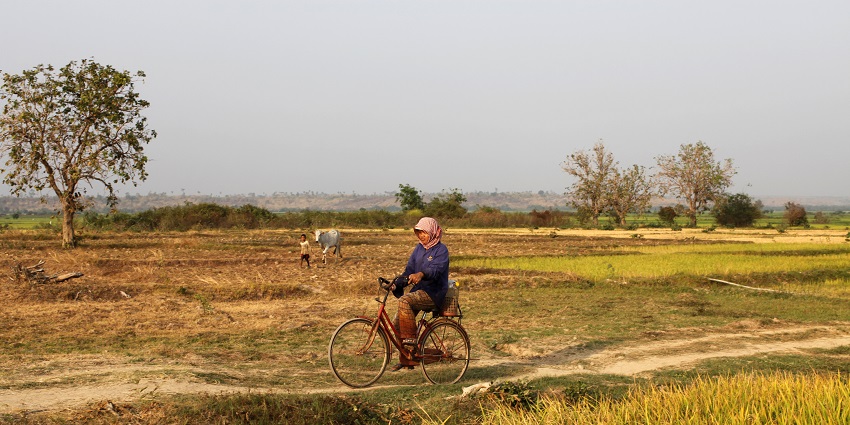
© Philippe Lissac
In partnership with CA CIB India, the Foundation provided a guarantee equivalent to €5 million to the Indian microfinance institution Annapurna, for a loan granted by CA CIB India in local currency. Annapurna Finance Pvt. Ltd (AFPL) was established in 2009 and is now one of the top ten NBFC MFIs in the country. The institution provides financial services to low-income populations. Its main objectives are to provide financial assistance for economic empowerment and to prioritize women and directly involve them in productive activities through self-help groups and access to finance. To date, the institution serves 1.6 million active borrowers, including 99% women and 85% rural borrowers.
Similarly, in Myanmar, the Foundation granted a new loan in local currency equivalent to €2.3 million over a four-year period to VisionFund Myanmar, a microfinance institution that lends small amounts of money to people who lack a measurable credit history, assets to secure loans, or access to traditional sources of financing. To date, VisionFund Myanmar has more than 190,000 clients, including 86% women and 59% clients in rural areas.
Also in Myanmar, the Foundation also granted a new loan in local currency equivalent to €1.8 million over a four-year period to the microfinance institution Proximity Designs on behalf of Proximity Finance, a microfinance program whose objective is to eradicate extreme poverty by treating the poor as clients. To date, the program has 117,000 clients, including 69% women.
Finally, in Cambodia, the Foundation granted a loan equivalent to €1.6 million to Chamroeun, a long-standing partner of the Foundation since 2010. Chamroeun is a microfinance institution that provides financial services to the poorest, excluded from the services offered by more commercial microfinance institutions. The institution serves more than 30,000 clients, including 82% women.
More information about the Foundation's partners here.
[Interview] “Technical assistance helps structure our agricultural microcredits”
Interview with Susan Chibanga, Managing Director, AMZ Zambia
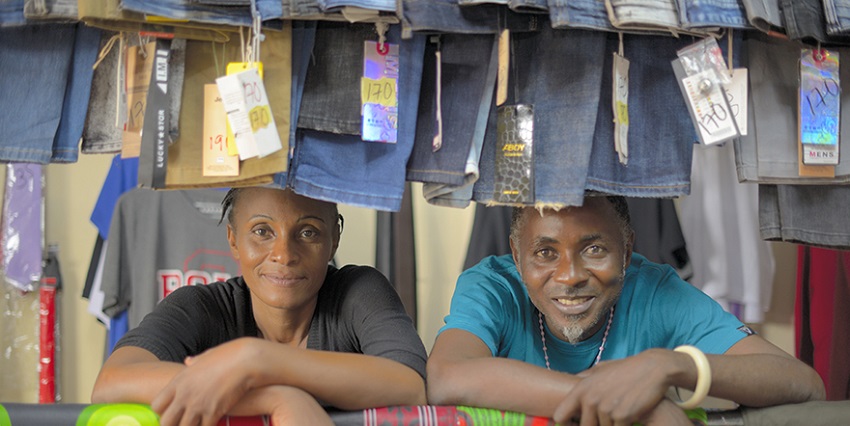
© Didier Gentilhomme
In Zambia, the microfinance institution AMZ provides microcredit, insurance, and money transfer services to more than 50,000 clients, primarily women (60%) and in rural areas (80%). Thanks to technical assistance provided under the African Facility program, AMZ was able to implement an agricultural loan assessment system for smallholder farmers, an innovation in Zambia and the wider region.
What are the activities and objectives of AMZ Zambia?
Susan Chibanga: Since the institution's creation eight years ago, we have been providing opportunities and contributing to the economic well-being of the poorest people. We provide them with access to appropriate financial services: village group loans, agricultural loans, microinsurance, and even mobile payments. Agricultural loans and rural financing are costly activities that require close monitoring.
To make them viable, we rely on the expertise of our partners such as the Grameen Crédit Agricole Foundation, which is both one of our financiers and a technical assistance coordinator for several of our projects (*).
How does technical assistance improve your microloans?
AMZ has just taken a step forward in structuring its microcredit business. Thanks to technical assistance from the Foundation and other partners, we have implemented a tool to help manage our products, the Agricultural Loan Evaluation System, a true innovation in the region. This resource was initially developed by the Frankfurt School of Business. It allows us to determine credit limits by simulating repayment models based on the type of crops grown by small or medium-sized farmers. We conducted a pilot project on corn, soybeans, tomatoes, watermelon, and peanuts during one growing season. We now want to roll it out more widely.
With what priorities?
We are considering developing a mobile application for the tool. It would be useful to combine it with our customers' credit ratings and more secure authentication systems, such as pen signatures and even facial recognition. Experience shows that the tool reduces risk exposure for both our institution and our beneficiary clients. Technical assistance will help us continue to make our lending more efficient.
What are AMZ's growth prospects?
Already established in the central region of Zambia, we aim to expand our operations throughout the country. We also hope to become a deposit-taking institution within two years, in addition to our lending activities. Our positioning in the regions will remain crucial, with a long-term portfolio of 10 to 15,000 smallholders.
____________________________________________________
(*) In order to develop rural and agricultural financing, AMZ Zambia is supported by national organizations (FSDZ, RUFEP) and international donors (Grameen Crédit Agricole Foundation, Oikocredit, FMO, Triple Jump, Global Partnership Lendahand), some of which, like the GCA Foundation, are also coordinators of technical assistance missions from which it benefits.
AIDS, UNHCR and the Foundation together for the inclusion of refugees in Uganda
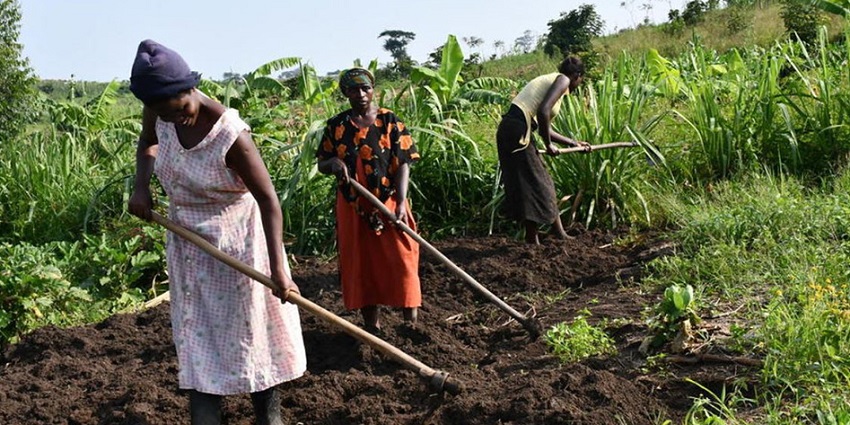
© UNHCR
KAMPALA: The Swedish International Development Cooperation Agency (Sida), the United Nations High Commissioner for Refugees (UNHCR) and the Grameen Crédit Agricole Foundation today launched a four-year program to promote access to financial and non-financial services for refugees and host communities in Uganda.
The program is an innovative blended financial approach that combines public and private funds to facilitate financing for refugees and host communities. Access to affordable credit services is essential for refugees to start, create, and expand businesses, meet their daily needs, and be more resilient in the face of emergencies. Furthermore, access to other types of financial services such as savings, payments, and insurance is essential to ensure the inclusion of refugees in the formal financial sector and promote their self-reliance and resilience.
An innovative approach
This is a unique program designed to incentivize microfinance investors and financial service providers (FSPs) to expand their financial services to refugees and host populations. The project is currently being piloted in Palorinya refugee camp in northern Uganda and Kampala, and will gradually be expanded to other targeted refugee-hosting districts.
"This is an effective way to use development aid. We leverage funds from other investors and thus ensure that scarce humanitarian funds can be released to help the most deprived refugees," says Carin Jämtin, Executive Director of SIDA.
The Grameen Crédit Agricole Foundation will provide debt financing to three financial service providers with a guarantee from SIDA, which will also fund the program's technical assistance through its humanitarian allocation. The Foundation will coordinate, with UNHCR, the technical assistance component to help the three FSPs develop a range of products and services, including financial education and business development training, for both refugees and members of host communities.
Supporting entrepreneurship
For UNHCR, the project is in line with the Comprehensive Refugee Response Framework (CRRF) and responds to the call to work with development agencies and the private sector to find durable solutions for refugees. Many refugees are entrepreneurs, having been entrepreneurs in their countries of origin or possessing entrepreneurial skills to create or expand a business activity in their host country. Mahoua Parums, UNHCR Representative in Uganda, welcomed this initiative and stated that “financial inclusion is a key element in finding long-term solutions for refugees, as it helps them rebuild sustainable livelihoods. Many refugees decide to start a business once settled in the country of asylum, and microfinance can help them grow their businesses, avoid aid dependency, and make an economic and social contribution to host communities.”
Through this program, refugees will receive training in entrepreneurial management that will equip them with essential skills such as developing business plans, financial education (including dealing with banks), pricing, and marketing.
“At the Foundation, we are convinced that microfinance institutions, while adapting their products and services, have an active role to play in promoting the financial inclusion of refugees. Digital finance opportunities, in-depth knowledge of the characteristics of each group, regular monitoring, and appropriate non-financial services should stimulate such involvement,” says Eric Campos, Managing Director of the Grameen Crédit Agricole Foundation.
In total, some 100,000 Ugandan refugees and hosts are expected to have access to financial services (credit and savings), including 70,000 women. The project will support the creation and development of small businesses in sectors such as agriculture, crafts, catering, and trade.
The Foundation continues its development in sub-Saharan Africa
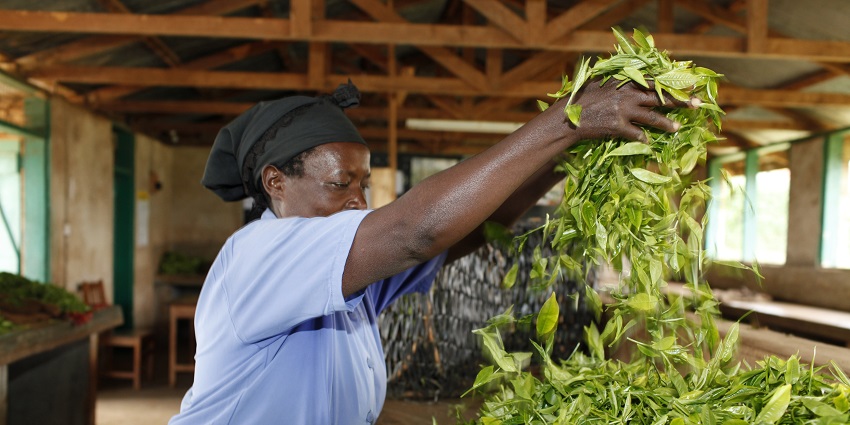
©Philippe Lissac
The Grameen Crédit Agricole Foundation continues to invest significantly in sub-Saharan Africa, its priority area of intervention, with three new investments in South Africa, Zambia and Burkina Faso.
In South Africa, the Foundation funded SEF. Founded in 1992 in Limpopo Province, the poorest region of the country, SEF provides microfinance products to women living in poor rural communities. SEF has gained considerable international recognition thanks to its poverty targeting methodology, the Participatory Wealth Ranking, one of the first tools of its kind officially recognized and promoted by the Microcredit Summit Campaign. The institution, which has 197,359 active clients (99% women and 56% clients below the national poverty line), has obtained its first loan equivalent to €3 million in local currency from the Foundation.
Similarly, the Foundation granted an initial loan to the microfinance institution MLF Zambia for an amount equivalent to €250,000 in local currency. MLF Zambia was established in 2008. Its activities are overseen by the Microloan Foundation, which is headquartered in the United Kingdom and regulated by the Charity Commission. MLF Zambia's main activity is to provide low-income women living in the predominantly rural areas of Zambia's Eastern, Southern, and Central provinces with short-term loans for productive purposes. The institution, which lends exclusively to women, has more than 11,000 clients. This investment is part of the African Facility mechanism developed in partnership with the AFD.
Still within the framework of the African Facility, the Grameen Crédit Agricole Foundation also granted a new loan to the microfinance institution PMBF SA (formerly SOFIPE) in Burkina Faso, for an amount in local currency equivalent to €750,000 over a period of three years. PMBF-SA is a microfinance institution that provides small entrepreneurs with various financial products. To date, the institution has approximately 17,000 clients, including 67% women.
More information about the Foundation's partners here.
The Grameen Crédit Agricole Foundation invests in Palestine
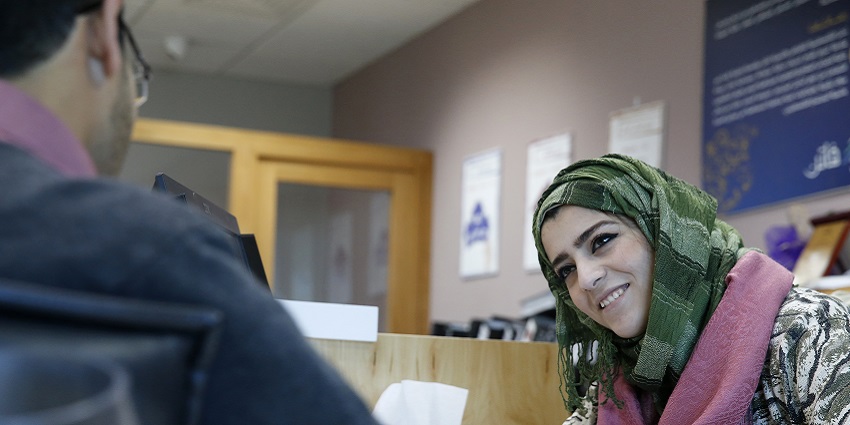
© Philippe Lissac
In November, the Grameen Crédit Agricole Foundation signed a new partnership in Palestine with the microfinance institution FATEN, for a loan equivalent to one million euros in local currency. The Foundation now has two partners in Palestine, where it has been present since 2012.
FATEN, an NGO that provides financial products and services to the country's small entrepreneurs, as well as farmers who own isolated land near Israel's separation wall. Its product offerings include group loans, individual loans, Islamic loans, and housing and startup loans.
FATEN is the largest microfinance institution in the region and operates in remote areas. The current stability has allowed the institution to expand while continuing to serve a majority of women, with a strong presence in rural areas and refugee camps.
___________________________________________________________
Created in 2008, under the joint leadership of Crédit Agricole SA's management and Professor Yunus, 2006 Nobel Peace Prize winner and founder of Grameen Bank, the Grameen Crédit Agricole Foundation is a multi-sector operator that contributes to the fight against poverty through financial inclusion and social impact entrepreneurship. As an investor, lender, technical assistance coordinator, and fund advisor, the Foundation supports microfinance institutions and social enterprises in nearly 40 countries.
More information about the Foundation's partners here.
The White Paper on Agricultural Insurance
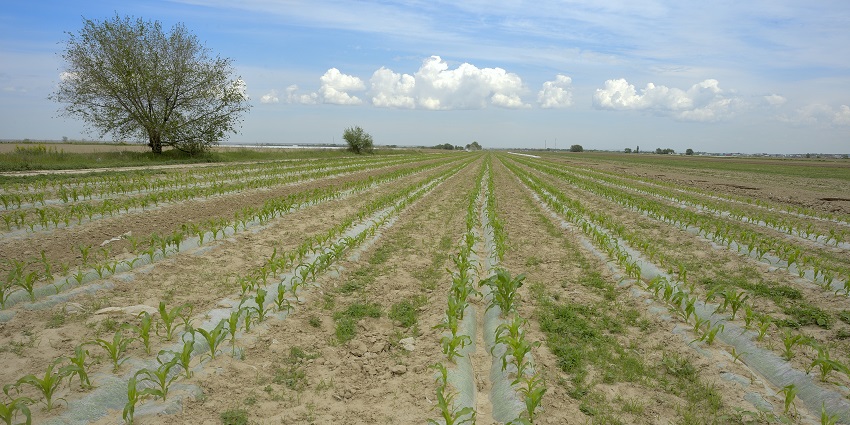
© Didier Gentilhomme
The White Paper published by the International Confederation of Agricultural Credit (CICA) in November is intended to contribute to the Sustainable Development Goals for more resilient agriculture that is better protected against climate hazards.
Since its creation in 1950, the International Confederation of Agricultural Credit (CICA) has organized an annual Congress, now called the Meetings. This provides an opportunity for the leaders of the Confederation's member banking and financial institutions to present studies and discuss topics of common interest.
These meetings take place on all continents in order to offer members an opening to other countries and agricultural, banking and cultural realities.
On the occasion of the 6th World Congress on Agricultural and Rural Finance, held on November 12 and 13 in New Delhi, CICA published The Agricultural Insurance White Paper, the result of 23 contributions that shed light on the challenges of agricultural insurance. Through the testimonies of various stakeholders in all regions of the world, the White Paper aims to contribute to the Sustainable Development Goals, for a more resilient and better protected agriculture against climate hazards. FARM of Crédit Agricole collaborated closely on the publication, which highlights how risk management is a key condition for improving the economic, social, and environmental performance of agriculture, in the North and the South.
Discover the White Paper here.

